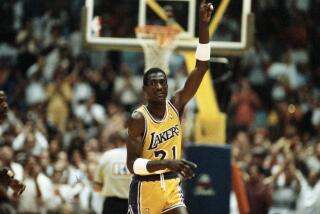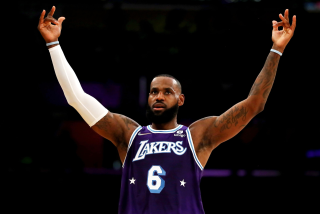Jordan Wasn’t Getting Older, He Was Getting Better
It’s a subtle thing, measuring the Quality of Air.
In two very different but equally regal incarnations, Michael Jordan led the Chicago Bulls to back-to-back-to-back NBA titles, broken up by an interesting little interlude in baseball’s minor leagues.
Which Jordan was the best Jordan?
The 20-something tomahawk-slammer who scored 30 points every night by defying most of the laws of gravity? Or the calmer, 30-something general who worked to distribute the ball, who rationed his energy, and who held back his explosions until the end-game moments?
To a man, the basketball experts contacted Wednesday had a quick reply: The older Jordan, while less likely to pull off circus shots, was the best Jordan. The sublime Jordan. The essential Jordan.
“Before he took the year off, I felt individually he was good as anyone I’d ever seen, taking all aspects of game into account,” UCLA legend John Wooden said.
“But after the layoff, perhaps because of the untimely and tragic death of his father, and finding out he couldn’t move into something else and get the acclaim and stardom he had in basketball, I think was good for him.
“It just appeared to me that not only was he a better basketball player after he took the year off, he was a better team player, even though maybe he lost a little bit--though I didn’t notice much--physical ability. . . .
“I don’t like to say anyone or any team is the best. I’d rather say among the best. But when I watched him after he came back, he really was the best I’d ever seen.”
Laker General Manager Mitch Kupchak said that he has been struck in recent days by video clips showing Jordan in his first few elastic years in the league compared to Jordan today.
Those images, Kupchak says, remind him just how much Jordan’s frame and game has changed.
“All these clips of him when he was three, four, five, six years in league, his early years, it’s incredible,” Kupchak said. “He was so much thinner and so much more athletic. . . . And you say, ‘My God, did he put on 20 pounds of muscle?’
“He’s a totally different player the last three or four years than he was six or seven years ago. Really, there’s a pre-baseball Michael Jordan and a post-baseball Michael Jordan.”
In Jordan’s final season, he had full-season career lows in scoring average (28.7), assists per game (3.5) and shooting percentage (.465). But in every single important moment, those statistics were meaningless.
Jordan’s second reign, Kupchak said, was about conservation of energy and a summoning of the will to win.
“He got stronger, and every move he made had purpose,” Kupchak said. “There was one clip in particular that struck me from his early days: He went through his legs three or four times and then shot a jumper over Larry Bird.
“He didn’t do that in the last three or four--that was wasted movement. It’s almost like he learned he didn’t have to do that move to get free, so why do that?
“And yet the times he needed to reach back and explode over a guy for a dunk, he could do it.”
The difference between Michael I and Michael II, said Bill Fitch, the longtime NBA coach, was that Michael II had so many more ways to beat you.
“He really did develop,” Fitch said. “Michael became a total player. I can recall him shooting them back into the game against us and then when it comes down to crunch time, we go to the ‘Jordan Rules,’ two guys and three cheerleaders on him, and he makes a pass to somebody wide open to make the bucket.
“I think that was typical of when he came back. He had a lot more tools in the arsenal to use. The legs did go--he didn’t have near the legs the last few championships that he did in the early ones. But that gray matter was growing.”
Scott Layden, vice president of basketball operations for the Utah Jazz, admits a little bias--Jordan beat his team in the NBA finals the last two seasons.
“We have more history with the second time around, after the baseball experience,” Layden said.
Jordan II, Layden said, was something to behold.
“I studied him during the finals, just watched him all the time, fascinated by him,” Layden said. “I wanted to know why he, in a collection of 400 of the greatest athletes in the world, was so far ahead of everyone else. It really comes down to mental toughness and his fortitude. It’s beyond belief.
“I’ll give you an example: The first finals we were in, two years ago, everybody was excited here, our first time. . . . The first game here, our crowd was unbelievable, the noise level, we had fireworks and motorcycles and our mascot coming down from the ceiling with a fireworks head dress. And it was crazy.
“And I looked down at the Chicago bench and everybody was holding their ears and wincing. Our bench guys were doing the same thing. . . . But I looked at Jordan, and it was his typical pose with his hands in his warmup pants, and he had his head bowed in total concentration and focus.
“It was interesting for me to see that. Because, you know what? Everyone else is worried about the noise and the crowd and all the theatrics going on. But he was not going to allow anything to get in the way of him winning the game.”
(BEGIN TEXT OF INFOBOX / INFOGRAPHIC)
Bulls 23
“For our own selfish reasons we never wanted to see Michael Jordan retire. He represented our personal flight of fantasy about what great things an individual can do and he made it look so easy.” PHIL JACKSON, Former Chicago Coach
“(It’s) the toughest day in the history of Chicago Bulls. . .a tough day for Chicago. . . a tough day for the NBA. . . a tough day for basketball fans all over the world.” JERRY REINSDORF, Chicago Owner
(BEGIN TEXT OF INFOBOX / INFOGRAPHIC)
Not Beyond Compare
A comparison of Michael Jordan’s nine seasons before he retired--the first time--in 1993 and his four seasons after he returned in 1995:
Before Retiring
Regular / Playoffs
Category
Games: 667 / 111
Field goal pct.: .516 / .501
Free throw pct.: .846 / .834
3-point FG pct.: .301 / .352
Minutes per game: 38.7 / 41.8
Rebounds: 6.3 / 6.7
Assists: 5.9 / 6.6
Points: 32.3 / 34.7
Scoring titles: 7
MVP awards; 3
NGA Titles: 3
NBA Finals MVP awards: 3
After Returning
Regular / Playoffs
Category
Games: 263 / 68
Field goal pct.: .477 / .463
Free throw pct. .814/ .818
3-point FG pct.: .375 / .307
Minutes per game: 38.2 / 41.6
Rebounds: 6.1 / 6.0
Assists: 4.1 / 4.2
Points: 29.4 / 31.4
Scoring titles: 3
MVP awards: 2
NGA titles: 3
NBA Finals MVP awards: 3
More to Read
Go beyond the scoreboard
Get the latest on L.A.'s teams in the daily Sports Report newsletter.
You may occasionally receive promotional content from the Los Angeles Times.










